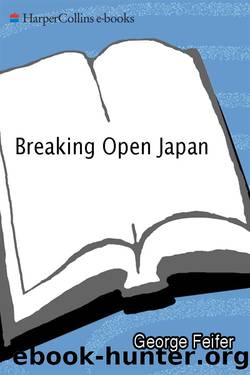Breaking Open Japan by George Feifer

Author:George Feifer
Language: eng
Format: epub
Publisher: HarperCollins
Published: 2013-03-10T16:00:00+00:00
SO MANY SO DISLIKED or detested the accommodation that Abe did something unprecedented. Until now, his idiosyncratic listening to ordinary folks’ opinions had been almost entirely a personal matter, only loosely related to his official life. As far back as anyone could remember, all major state decisions had been made by consensus among members of the roju, with no other participation. Four years earlier, Abe had asked the lords of coastal domains whether the 1842 policy of giving aid to needy foreign ships should be scrapped in favor of restoring the 1825 order to fire at sight. But that was a stratagem partly for keeping everyone happy, one of the tendencies that earned him the criticism for being indecisive. Widening the tiny circle of the makers of state decisions was on very few minds, let alone official agendas.
Two weeks after Perry’s departure, however, he took his exceptional venture in that direction. It wasn’t for introducing the “unheard-of concept”26 of participatory government but for soliciting the help he needed. Hoping the roju would speak with a unified voice, he “heard only cacophony”—and now the danger of fatal discord as well. His radical new move wasn’t to advance Japan from its sometimes suffocating elitism but to cover himself by trying to spread the ignominy of reversing age-old policy, which is another way of saying it was less in response to any democratic instinct than to Perry’s force. But England’s King John didn’t sign the Magna Carta to which some attribute the beginnings of his country’s democracy because he wanted to make a statement about human rights, nor did he have the slightest interest in commoners’ liberties. Few large steps toward democratic government had been taken anywhere else except under external pressure.
Abe’s extraordinary gamble in early August 1853 was to organize a kind of referendum among a thousand-odd important persons. The deep resentment of the implication of Fillmore’s message—and of Perry’s two additions that sharpened it, topped by what many saw as his warmongering white flags—was a given. But maybe the occasional praise for Perry’s restraint from firing and the continued hope that Americans would prove less rapacious than the British would offer some leeway for maneuver. Hoping for that, the Chief Senior Councilor sent copies of the translation of the presidential letter to the daimyo, Confucian scholars, high bakufu officials, and even the imperial court: a who’s who of the feudal system. What did they think about the demands? Should the country open itself or remain closed? Do not, he instructed, feel restricted by the old precedents. Even opinions that might offend the authorities should be expressed without hesitation.
Surely his acuity and experience warned him of the danger he was courting. Further undermining the shogunate’s claim to wisdom and credibility, the request for advice exposed its policies to discussion and criticism. However, the alternative of great loss of face by submission to Perry without outside support might be worse for the government.
The support proved to be weak. Most of the Confucian scholars urged driving off the Americans without making any concessions to them.
Download
This site does not store any files on its server. We only index and link to content provided by other sites. Please contact the content providers to delete copyright contents if any and email us, we'll remove relevant links or contents immediately.
| Africa | Americas |
| Arctic & Antarctica | Asia |
| Australia & Oceania | Europe |
| Middle East | Russia |
| United States | World |
| Ancient Civilizations | Military |
| Historical Study & Educational Resources |
The Dawn of Everything by David Graeber & David Wengrow(1707)
The Bomber Mafia by Malcolm Gladwell(1622)
Facing the Mountain by Daniel James Brown(1553)
Submerged Prehistory by Benjamin Jonathan; & Clive Bonsall & Catriona Pickard & Anders Fischer(1455)
Wandering in Strange Lands by Morgan Jerkins(1427)
Tip Top by Bill James(1415)
Driving While Brown: Sheriff Joe Arpaio Versus the Latino Resistance by Terry Greene Sterling & Jude Joffe-Block(1375)
Red Roulette : An Insider's Story of Wealth, Power, Corruption, and Vengeance in Today's China (9781982156176) by Shum Desmond(1359)
Evil Geniuses: The Unmaking of America: A Recent History by Kurt Andersen(1352)
The Way of Fire and Ice: The Living Tradition of Norse Paganism by Ryan Smith(1336)
American Kompromat by Craig Unger(1315)
F*cking History by The Captain(1303)
It Was All a Lie by Stuart Stevens;(1300)
American Dreams by Unknown(1285)
Treasure Islands: Tax Havens and the Men who Stole the World by Nicholas Shaxson(1272)
Evil Geniuses by Kurt Andersen(1257)
White House Inc. by Dan Alexander(1211)
The First Conspiracy by Brad Meltzer & Josh Mensch(1174)
The Fifteen Biggest Lies about the Economy: And Everything Else the Right Doesn't Want You to Know about Taxes, Jobs, and Corporate America by Joshua Holland(1125)
